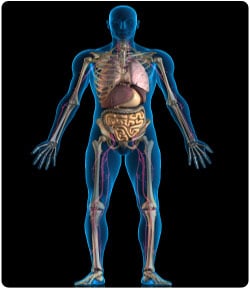Students can have a better understanding of human anatomy, if all the organs and parts are painted on a real live body, according to an Australian expert.
Students can have a better understanding of human anatomy, if all the organs and parts are painted on a real live body, according to an Australian expert.
Professor Paul McMenamin, of the University of Western Australia, reckons that body painting can turn out to be a useful tool in anatomy classes."Essentially we're using a three-dimensional canvas in the shape of the body," ABC Online quoted him as saying.
"You can paint the muscles on and bring them to life. It's just fantastic when you see it. People just go 'Oh my God,'" he added.
McMenamin has been using body painting in classes for about four years.
He says that when students paint muscles, tendons, nerves, blood vessels and even organs, like the heart, on a model, or on each other, the visual impact helps them learn more than they would otherwise.
"They see the heart and it's almost as if it's there in front of them. As if they'd ripped the skin and ribs off and the heart's right there," he added.
Advertisement
He also points out that the students in body painting class wear swimwear that can be painted on, and that the only limitation with the method is when it comes to drawing hearts.
Advertisement
In his opinion, the method will also help young students get used to having physical contact with patients.
McMenamin got the idea from a Dutch group that reported using body painting to teach the location of the stomach and bowel, and since than he is giving talks and workshops on it around the world.
The study has been published in the journal Anatomical Sciences Education.
Source-ANI
SRM









